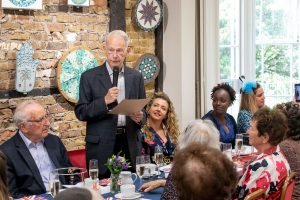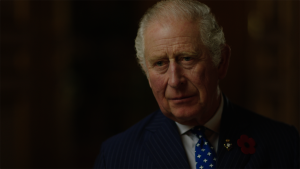The death of Her Majesty Queen Elizabeth II
It was with great sadness that we learned of the death of Her Majesty Queen Elizabeth II. We share in the deep shock felt across the country, and around the world, as well as the gratitude felt by so many for her service to the nation.

Holocaust survivor Gabriel Klein shows Queen Elizabeth II his Star of David arm patch during a reception at St James’s Palace marking Holocaust Memorial Day in 2005. Image: PA
The Queen was Patron of the Holocaust Memorial Day Trust at our inception in 2005 and she attended the Holocaust Memorial Day 2005 National Ceremony in Westminster Hall, hosting a reception for survivors of the Holocaust, Nazi persecution of other groups, and the genocides that followed in Cambodia, Rwanda, Bosnia, and Darfur.
Olivia Marks-Woldman OBE, Chief Executive of the Holocaust Memorial Day Trust said:
Her Majesty the Queen represented the warmth and welcome that so many survivors found in the UK. Her consistent support for the work of the Holocaust Memorial Day Trust held profound meaning, not only for survivors of the Holocaust and genocide, but also for all those who could see the highest possible value placed on Holocaust and genocide commemoration and education. Her Majesty’s personal commitment and dedication will be so enormously missed. All of us at the Holocaust Memorial Day Trust deeply mourn her passing and send our heartfelt condolences to our Patron, The King. May her memory be a blessing.
On the occasion of the reception which followed the national Holocaust Memorial Day Ceremony in 2005, at St James Palace, she broke with royal protocol to mingle with survivors. The then Chief Rabbi Lord Jonathan Sacks said at the time:
One of her attendants said that he had never known her to linger so long after her scheduled departure. She gave each survivor — it was a large group — her focused, unhurried attention. She stood with each until they had finished telling their personal story.
She awarded honours to many survivors of the Holocaust, Nazi persecution of other groups, and survivors of the genocides that followed in Cambodia, Rwanda, Bosnia, and Darfur over many decades. This has been of enormous symbolic significance, sending a message to those who would distort or deny the Holocaust or other genocides, that she places enormous value in learning from these survivors’ testimonies. These honours are, of course, of great personal significance to the individuals and their families too.

John Hajdu MBE giving a speech at the Queen’s Platinum Jubilee tea party we held for survivors in May 2022
John Hajdu MBE, a survivor of the Holocaust said:
When I arrived in Britain in February 1957, Her Majesty the Queen had been on the throne for just four years. It was absolutely incredible to see how welcoming the British people were to refugees such as myself. But never in my wildest dreams did I ever think that I would one day be a recipient of one of the highest state awards given by Her Majesty. For that, I’m very thankful.
She also hosted dozens of survivors as guests at the Queen’s Royal Garden Parties. In 2013, this included Sophie Musabe Masereka who survived the genocide against the Tutsi in Rwanda.
Sophie remarked at the time:
It was such a lovely day and wonderful experience, everyone was dressed in beautiful colours, wearing hats and inside the palace, I felt such a warm atmosphere. When Her Majesty and the Royal Family joined us, we were all facing them with smiles in our faces, they walked among people shaking their hands.
In 2015, Her Majesty visited Bergen-Belsen on a German state visit alongside her husband Prince Phillip. The Queen, who had not visited a concentration camp before, is believed to have requested the visit.

Our Patron, then HRH The Prince of Wales, speaks about the portraits project in a BBC documentary © Tom Hayward and BBC Studios 2021
More recently, last January, our Patron, then HRH The Prince of Wales, commissioned seven leading artists to paint seven survivors of the Holocaust, for display at The Queen’s Gallery, Buckingham Palace.
On that occasion His Royal Highness said:
As the number of Holocaust survivors sadly, but inevitably, declines, my abiding hope is that this special collection will act as a further guiding light for our society, reminding us not only of history’s darkest days but of humanity’s interconnectedness as we strive to create a better world for our children, grandchildren, and generations as yet unborn; one where hope is victorious over despair and love triumphs over hate.
We are very grateful for the Queen’s longstanding support and our thoughts and prayers are with His Majesty the King and all the Royal Family at this time.
Joan Salter MBE who survived the Holocaust said:
I came to the UK as a child survivor of the Holocaust in 1947 and I remember the excitement surrounding the Queen’s coronation. For someone who came from so much upheaval and trauma, the Queen has been an important symbol of wisdom and stability for me. My thoughts are with the Royal Family at this difficult time.